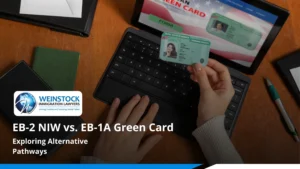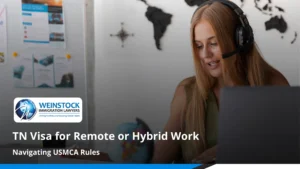H-1B Electronic Registration Process has been Formally Announced by USCIS
As confirmed by USCIS in the Final Rule from January 31, 2019, a Federal Register notice has been published formally announcing the implementation of registration process for fiscal year 2021 H-1B. What this implies is that the season for this new electronic filling will commence on March 1st, 2020, however there will be a limited number of Visas available, a combination of H-1B’s available of 65,000 and another 20,000 to those with a U.S. Masters degree.
The initial registration period will last until March 20, 2020 for the FY 2021 H-1B numerical allocations. Let’s stop for a moment here and let us go back and read what an H-1B visa is (and we quote bellow):
“The H-1B visa is an employment-based, non-immigrant visa for temporary workers. For this visa, an employer must offer a job in the US and apply for your H-1B visa petition with the US Immigration Department. This approved petition is a work permit which allows you to obtain a visa stamp and work in the U.S. for that employer.”
Perfect, so this is what an H-1B visa is or stands for. It’s essence lies with the need of US companies to contract foreign workers who will be allowed to fill a job in US soil and for a determined period of time. The US company employer needs and has to plan ahead in order to obtain authorizations to bring in their desired candidates. The amount of openings is determined by the employers, which are always higher in number compared to the number of Visas extended under this program by USCIS.
With the new implemented process what occurs is that larger companies will go in, register, and for certain, will fill up most of the available quota, making this new process somehow to be disadvantageous for the mid to small size US employer. In order to prepare for this new process, outreach activities will take place before the opening of the initial registration period, to allow users the opportunity to familiarize themselves with the new electronic registration process. USCIS will conduct in-depth webinars and publish a series of videos for attorneys and general users to walk through the system step-by-step. May these be sufficient? Will most companies attend and be involved ?
The USCIS publication regarding the start of the new process reads:- During this timeframe, H-1B cap-subject petitioners, including those eligible for the advanced degree exemption, seeking to file a FY 2021 H-1B cap petition will be required to first register electronically with USCIS and pay the associated $10 H-1B registration fee for each submission.
- Prospective petitioners or their authorized representatives must electronically submit a separate registration naming each alien for whom they seek to file an H-1B cap-subject petition. Duplicate registrations are prohibited.
- As described in the H-1B registration final rule, if more than a sufficient number of registrations are received, we will randomly select the number of registrations projected as needed to reach the FY 2021 H-1B numerical allocations after the initial registration period closes and notify registrants with selected registrations no later than March 31, 2020.
- Prospective petitioners with selected registrations will be eligible to file a FY 2021 cap-subject petition only for the alien named in the registration and within the filing period indicated on the eligibility notice.
- USCIS will not consider a cap-subject H-1B petition to be properly filed unless it is based on a valid, selected registration for the same beneficiary and the appropriate fiscal year, unless the registration requirement is suspended. Additionally, although petitioners can register multiple aliens during a single online submission, a petitioner may only submit one registration per beneficiary in any fiscal year. If a petitioner submits more than one registration per beneficiary in the same fiscal year, all registrations filed by that petitioner relating to that beneficiary for that fiscal year will be considered invalid.
In closing and despite the way the process has been laid out and presented, the key factor, as in everything, has to do with Supply and Demand. Will US employers be ready in case they can not bring in required work force? Will our economy, sustained in main proportion by US owned companies, suffer ? Having to wait and see is normally not the best way to conduct prosperous business, certainly being the USA the nation where the most important corporations are located and where most of the worldwide business volume takes place. Expectations are that a push for change in the process and an increase of H-1B visas available should not be ignored, specially and precisely by the US corporations. Their involvement is key.
Related posts

Exploring Alternative Pathways: EB-2 NIW vs. EB-1A Green Card
Summary Two of the most sought-after green card options for highly qualified professionals are: EB-2 National Interest Waiver (NIW) EB-1A Extraordinary Ability visa Both allow

TN Visa for Remote or Hybrid Work: Navigating USMCA Rules
Summary If you’re a Canadian or Mexican entrepreneur living in the U.S. or planning to launch a business here, you may be wondering: Can I

Impact of USCIS Policy Updates on EB-2 NIW Petitions: What You Need to Know
Summary The EB-2 National Interest Waiver (NIW) offers a pathway to U.S. permanent residency without employer sponsorship, ideal for professionals and skilled workers. Recent USCIS
